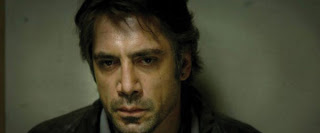 Armadillo (Metz, 2010) Denmark. Winner: Critics Prize at Cannes 2010.
Armadillo (Metz, 2010) Denmark. Winner: Critics Prize at Cannes 2010.
It was a surreal experience watching Armadillo, especially on the heel of the Oscar-winning film, The Hurt Locker (a film that used a documentary, in-action style to explore a bomb squad's life in Iraq during the war). The line between documentary style film-making and fictional film-making has become thin enough that a real documentary like this would seem at times fictional (possibly due to the amazing editing work). The Danish film unfolded like an assured, dramatic, emotionally resonant fictional film, as it documented the life of soldiers at Armadillo, an operating base that was home to Danish and British soldiers in Helmand province, Afghanistan, where they supposedly were trying to drive out the Talibans and establish 'peace.' The soldiers were followed from the time they set out to say good-bye to their families to the end of their mission. We saw them bonded over porn and macho activities, waiting anxiously to face 'war' as they expected. Instead, they were treated to months of little activities other than the occasional interactions with the locals, many of whom weren't too thrilled with their presence and blamed them for the region's increased instability. The Talibans hid with the locals, and one really got a sense of how difficult it was to simultaneously on the defense/offense and not yield collateral damages. When they finally were tested in the extreme confusion of combat fires, the implications of their actions (did they really break the rule of engagement and "liquidate wounded people and pile up the dead to take pictures of [themselves] as heroes?") were profound, and caused quite a stir in Denmark. The soldiers were allowed to defend themselves in the film - through their words as well as the footage of them in combat. Perhaps Metz summed it up best when he said: "maybe we're looking at something that goes to the core of something very human. The soldiers are so close to death and they actually kill someone. The way they handle the bodies afterward maybe testifies to something at the very core of humanity – of our grubby human nature. War has always been there. It has always been part of us." (quote via The Guardian) Biutiful (Iñárritu, 2010) Mexico.
Biutiful (Iñárritu, 2010) Mexico.
Iñárritu aims high when it comes to finding misery in the world. His matrix of human connections is that of misfortunes (see his previous films: 21 Grams, Babel). Good people make unfortunate decisions to survive, only to end up with horrible consequences because, well, life is just unforgiving like that. Uxbal (Javier Bardem), true to Iñárritu's typical character style, was forced to make difficult choices every day of his life, as he lived in the shadows of human existence with a family strung together tenuously by the wife's bipolar condition. He had a terminal disease; his children were abused; his wife was a chaotic presence; his brother slept with her behind his back; his good friend sold illegal drugs but he had to provide covers for; his predatory business partners exploited him as much as they could; the people he helped using his psychic gift (he could see the dead and their last thought) were resentful of his message as often as they were grateful for it; and his well intended decisions just kept getting him further tangled in a never-ending web of suffering. The good times did not stay long, and they were never wholeheartedly created to be just so. Uxbal's descent into hell was gradual and torturous: even by the time his spirit was thrown a life line in the form of an imagined family face, it was not much of a relief. Iñárritu wants you to get that life really, truly sucks for some people, and perhaps misery ends only after life. It was an exercise in feeling helpless, albeit a beautifully shot one. R U There (Verbeek, 2010) Netherlands.
R U There (Verbeek, 2010) Netherlands.
It was a typical exotic love story: Caucasian boy traveled the world and fell for a beautiful, mysterious local girl. They had an ambiguous relationship both online and offline. Verbeek attempted to investigate the line where the virtual world met reality, but what he ended up with was a feature-length advertisement for Second Life. The problem was, Second Life was anti-cinematic, choppy, shallow, hollow, and awkward. The chemistry off screen was not any better, despite the leads' effort to look as though they belonged in the same movie. There was one brief moment where Verbeek almost had a decent film: Jitze (Stijn Koomen), a professional gamer who was in Taiwan to compete in a video game tournament, witnessed a motor vehicle accident that he did nothing about. Then, instead of cutting away, the camera lingered a little too long, going for that unnecessary sensational effect. Elsewhere, the film skipped ever too lightly and superficially on the virtual worlds its main characters occupied - both the virtual gaming industry and Second Life resembled ideas of what they could look like, according to outsiders. The film bore an interesting premise, but that was all it was.
Home » Social Relations » VIFF 2010 capsule reviews: Armadillo, Biutiful, R U There (Day 3)
VIFF 2010 capsule reviews: Armadillo, Biutiful, R U There (Day 3)
Tweet
Categories
Best of Cinema,
Documentary,
English Subtitled,
In Brief,
Intimate,
Social Relations
Comments
Author
Editor
 Subscribe
Subscribe
5 Response to VIFF 2010 capsule reviews: Armadillo, Biutiful, R U There (Day 3)
Couldnt agree more with that, very attractive article
Nice site, nice and easy on the eyes and great content too.
Useful blog website, keep me personally through searching it, I am seriously interested to find out another recommendation of it.
Couldnt agree more with that, very attractive article
this post is very usefull thx!
Post a Comment